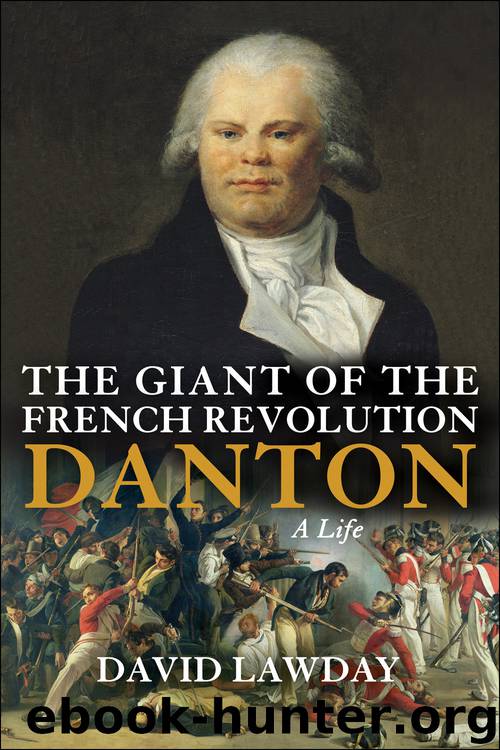The Giant of the French Revolution by David Lawday

Author:David Lawday
Language: eng
Format: epub
Publisher: Grove/Atlantic, Inc.
Published: 2009-08-20T16:00:00+00:00
TWELVE
The Execution of a King
In his heart Danton probably did not want Louis XVI to die. To have told Lameth so was no lie. Less straightforward was his conditional promise to do all he could to save the king from execution. It was a swinishly difficult issue, made still more awkward for him by the harassment of the Girondins, who likewise did not want Citizen Capet’s head to roll. It was hard to turn round and link arms with the Roland-Brissot tribe after all they had thrown at him. Besides, he regarded their policies and their disdain for political unity as an outright invitation to civil war, the prospect of which perhaps now fused in his mind with the king’s fate.
Standing constitutional law made the imprisoned Louis XVI ‘inviolable’ – except if he deserted the kingdom, took charge of a foreign army or refused to take the oath creating a constitutional monarchy. But that was the hasty law manufactured over a year ago, in the summer of 1791, to protect him against accusations of high treason after his flight to Varennes, and not only did the birth of the republic and the preparation of a new constitution render it moot, there was not a man in the Convention who was blind to Louis’ serious flirtations with all three proscribed acts.
The king was, then, guilty. Public opinion was convinced of it.
Robespierre, Marat and the radicals of the Mountain argued that there was no need for a trial; Louis had to pay for his treason with his head. To dissuade the Convention from going through the process of judging the king, Robespierre contrived some artful legal questions: if the king were brought to trial before a court, did that not mean he had to be presumed innocent? In which case, the Revolution would likewise be in the dock. But the minds of most patriots were too set on a trial to be swayed by legal conundrums and, on 13 November 1792, the Convention voted to sit in judgement on Louis XVI just as soon as the prosecution documents were ready.
The ghost of Oliver Cromwell again joined the fray. It was a relief for Danton that Cromwell’s name was thrown around this time without targeting him personally. Roundheads and the republican interlude they introduced across the Channel lived close enough in history to hold the Revolution’s attentions and to invite its questions. Had England’s Lord Protector gained anything for his cause by taking Charles I’s head? Could Charles’ execution have been the mistake that ultimately defeated England’s revolution? A second Englishman entered the debate, too, headlong as usual. Tom Paine, an honorary Girondin who nonetheless liked to vary his seat in the Convention and these days planted himself as often as possible next to the mighty Danton, campaigned for a show trial of monarchy itself. Danton again recognised Paine’s motive: it would stand as a trial in absentia of the British monarchy too.
In Paine’s view, Louis’ wretched person should be considered beneath parliament’s notice now that the republic was in place.
Download
This site does not store any files on its server. We only index and link to content provided by other sites. Please contact the content providers to delete copyright contents if any and email us, we'll remove relevant links or contents immediately.
| Belgium | France |
| Germany | Great Britain |
| Greenland | Italy |
| Netherlands | Romania |
| Scandinavia |
Room 212 by Kate Stewart(5091)
The Crown by Robert Lacey(4791)
Endurance: Shackleton's Incredible Voyage by Alfred Lansing(4743)
The Iron Duke by The Iron Duke(4337)
The Rape of Nanking by Iris Chang(4189)
Joan of Arc by Mary Gordon(4080)
Killing England by Bill O'Reilly(3987)
Say Nothing by Patrick Radden Keefe(3964)
I'll Give You the Sun by Jandy Nelson(3417)
Shadow of Night by Deborah Harkness(3341)
Hitler's Monsters by Eric Kurlander(3320)
Mary, Queen of Scots, and the Murder of Lord Darnley by Alison Weir(3189)
Blood and Sand by Alex Von Tunzelmann(3181)
Eleanor & Park by Rainbow Rowell(3139)
Darkest Hour by Anthony McCarten(3112)
Margaret Thatcher: The Autobiography by Thatcher Margaret(3065)
Book of Life by Deborah Harkness(2913)
Red Famine: Stalin's War on Ukraine by Anne Applebaum(2909)
The One Memory of Flora Banks by Emily Barr(2847)
